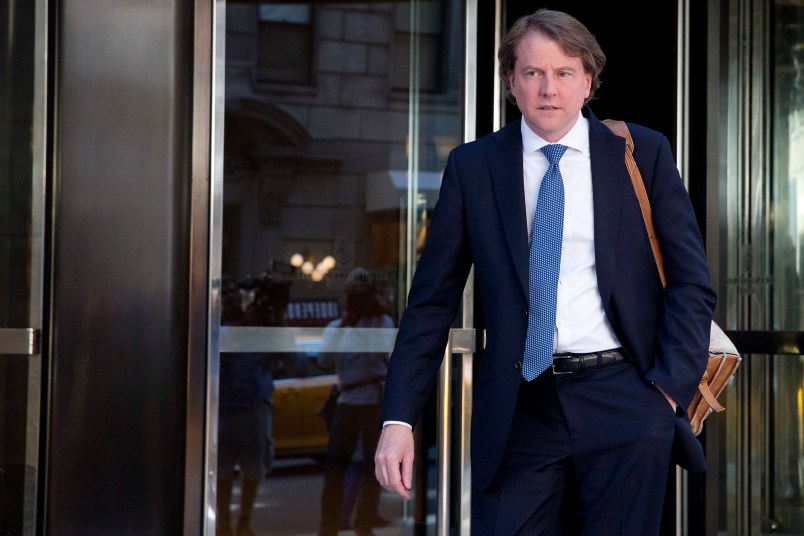My read on Eli Lake’s story about Susan Rice ‘unmasking’ Trump transition officials is that it’s a rather elaborate attempt to make a scandal out of something that isn’t scandalous at all. Given what we know just about Mike Flynn’s activities in November and December of 2016 alone, Rice’s alleged actions don’t seem that surprising at all. National security experts seem to agree.
But here’s something in the story that got my attention.
Read this paragraph, the third graf down in the story.
The National Security Council’s senior director for intelligence, Ezra Cohen-Watnick, was conducting the review, according to two U.S. officials who spoke with Bloomberg View on the condition of anonymity because they were not authorized to discuss it publicly. In February Cohen-Watnick discovered Rice’s multiple requests to unmask U.S. persons in intelligence reports that related to Trump transition activities. He brought this to the attention of the White House General Counsel’s office, who reviewed more of Rice’s requests and instructed him to end his own research into the unmasking policy.
What jumps out to me here is the last sentence. Cohen-Watnick, whose new boss, National Security Advisor H.R. McMaster, was trying to fire him while all this was happening, took his ‘research’ to the White House Counsel’s Office. They reviewed what he had come up with, did some additional research on Rice’s requests and then “instructed him to end his own research.”
This is all very cryptic and it’s sort of a throwaway line in Lake’s story. It’s so spare you could read a number of possibilities into the sentence. Maybe the Counsel’s office said, ‘Wow, this is so big we need to take over this critical investigation you’ve started. Thank you so much for your work.’ But that does not seem like the most likely read.
I would suggest that a much more plausible read is that Cohen-Watnick brought his ‘research’ to the Counsel’s office, they looked at and basically said, ‘Knock it off.’
That would make sense on a few fronts.
As even Lake concedes, Rice’s alleged actions – if the report is accurate – were almost certainly legal. Most national security experts say they were not only legal but entirely proper. Moreover, the kind of snooping around that Cohen-Watnick was apparently doing could very plausibly be interpreted as an attempt to monitor or interfere with the on-going counter-intelligence probe of Trump associates’ ties to Russia. The White House Counsel’s job is to protect and look after the legal interests of the President. A good lawyer would likely want to shut that kind of freelancing down right away, especially if what Cohen-Watnick had found didn’t amount to anything that helped the President or the White House.
The paragraph above also says Cohen-Watnick was “conducting the review.” But what review was that? It’s not clear this ‘review’ was authorized by anyone and it’s fairly implausible that he just stumbled on this stuff in the first place ‘in the normal course of business’, as he and the White House claim. His review apparently began in February. So if it was authorized it was likely okayed by Mike Flynn – another red flag.
So did Cohen-Watnick get shut down by White House Counsel Donald McGahn?
The main reason this read makes sense to me is what happened subsequently.
Why did Cohen-Watnick and Michael Ellis, a junior lawyer who used to work for Chairman Nunes, call Nunes late in the evening and have him rush over to the White House to see the ‘smoking gun’ information that supposedly validated President Trump’s ‘Obama wiretapping’ tweets? Remember, this overnight cloak and dagger stunt was followed the next day by Nunes going and ‘briefing’ President Trump about the new information.
So the White House briefs Nunes in the middle of the night and then Nunes returns to the White House in the morning to brief Trump?
That never made sense.
But it makes perfect sense if Cohen-Watnick (Mike Flynn’s protege, remember) got shut down by McGahn and then decided to backchannel his findings to Trump supporters on the Hill in order to do an end run around his bosses. It also explains why Nunes had to see the documents at the White House (likely at Ellis’s or Cohen-Watnick’s desk) rather than on Capitol Hill or at a relevant intelligence agency. Showing him the material anywhere else would have required letting others know what they were doing. Of course, it also explains why Nunes would need to brief Trump: because Cohen-Watnick probably wasn’t allowed to do so directly.
This is, I grant, informed speculation. But it explains pretty much all the facts and mysteries about the Nunes overnight caper, his continuing inability to explain it in any clear or consistent way and his eventual refusal to discuss it with anyone else on his Committee.
[Did you enjoy reading this post? Want to make more like it possible? Consider supporting TPM by subscribing to Prime.]






